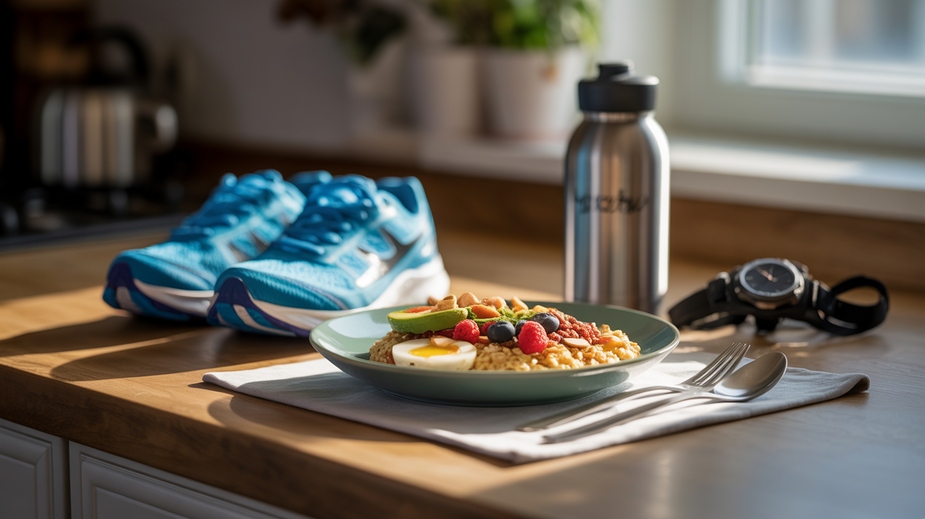The Role of Breakfast in Athletic Performance
For athletes, breakfast is more than just the first meal; it’s a strategic opportunity to replenish the body after an overnight fast and prime it for the demands of training or competition. The nutrients consumed in the morning directly influence energy levels, mental focus, physical stamina, and overall workout quality. By providing readily available carbohydrates to support muscle glycogen stores and helping maintain stable blood glucose, a well-planned breakfast ensures the body has the essential fuel needed to perform effectively, whether tackling an early morning session or establishing a nutritional foundation for later activity. Skipping this crucial meal can leave an athlete underfueled, potentially hindering performance from the outset.
However, effective morning fueling requires careful consideration. Athletes often face challenges by either consuming insufficient fuel or overconsuming, particularly before training. Under-fueling, such as skipping breakfast or eating too little, can lead to depleted energy reserves, manifesting as fatigue, dizziness, difficulty maintaining intensity, and the dreaded “bonk.” Conversely, over-fueling, especially with foods that are difficult to digest or consuming large volumes too close to exercise, can cause digestive distress, nausea, cramps, and a sensation of sluggishness as the body prioritizes digestion over muscular work. Navigating these extremes is essential for optimizing training outcomes and avoiding unnecessary discomfort.
| Common Pitfall | Potential Impact on Training Performance |
|---|---|
| Under-fueling | Low energy, premature fatigue, impaired focus, reduced power output, increased risk of hitting ‘the wall’ |
| Over-fueling | Digestive upset, nausea, abdominal cramps, feeling heavy or sluggish during exercise |
Furthermore, the impact of breakfast extends beyond the immediate workout, laying a foundational role in recovery. While post-exercise nutrition is critical for muscle repair and glycogen resynthesis, starting the day adequately fueled ensures the body is not in a significant energy deficit entering the training session. This proactive fueling position helps prime the body to initiate the recovery process more efficiently once exercise concludes, facilitating quicker regeneration and enhancing readiness for subsequent training bouts. Thus, a thoughtfully constructed breakfast supports a continuous cycle of effective fueling, robust performance, and accelerated recovery vital for athletic development.
Nutrient Density vs. Caloric Load
For athletes, breakfast is a key moment to fuel the body optimally without impeding performance or negatively impacting body composition. This necessitates understanding the crucial distinction between nutrient density and simple caloric density. Nutrient-dense foods deliver a substantial amount of essential vitamins, minerals, fiber, high-quality protein, and healthy fats relative to their energy content. They provide robust support for metabolic processes, muscle maintenance, hormonal balance, and overall systemic health. In stark contrast, calorie-dense but nutrient-poor foods, often termed sources of “empty calories,” supply significant energy but lack meaningful amounts of vital nutrients. Consuming too many of these can contribute to feelings of lethargy, suboptimal recovery, and difficulties managing weight despite a high caloric intake.
An effective strategy for maximizing morning fuel quality is to cultivate the ability to identify genuinely nutrient-rich options while actively avoiding hidden sources of empty calories that can undermine your efforts. These less-than-ideal choices often appear in common breakfast items like highly refined cereals, pastries, sweetened dairy products, fruit juices with added sugar, and many processed breakfast bars lacking substantial fiber or protein. They offer a rapid energy spike often followed by a crash and contribute calories without providing the necessary building blocks for athletic function and recovery. Prioritizing whole, minimally processed foods represents the most dependable approach to ensuring you receive maximum nutritional value for every calorie consumed.
Emphasizing nutrient density also leverages the powerful concept of the satiety-to-calorie ratio. Foods rich in protein, fiber, and healthy fats generally promote greater feelings of fullness and satisfaction than those composed primarily of refined carbohydrates and added sugars. This means they contribute to lasting satiety on fewer calories, naturally helping to regulate appetite and prevent excessive eating or cravings later in the day. For an athlete requiring sustained energy for training without the distraction of hunger or the burden of carrying excess weight, this ratio holds significant importance.
Consider the following comparison highlighting the difference between nutrient-dense options offering high satiety and low-nutrient choices contributing mainly empty calories:
| Nutritional Focus | Example Breakfast Item | Key Contribution to Athlete’s Diet | Satiety Level |
|---|---|---|---|
| Nutrient-Dense | Scrambled Eggs with Spinach | High-quality protein, Iron, Vitamins A & K, Choline | High |
| Empty Calories | Large Bakery Muffin | Refined flour, High sugar, Unhealthy fats | Low (quick energy spike followed by dip) |
| Nutrient-Dense | Plain Greek Yogurt with Berries and Chia Seeds | Protein, Probiotics, Fiber, Antioxidants, Omega-3s | High |
| Empty Calories | Sugary Breakfast Cereal with Skim Milk | Refined carbs, Significant added sugar, Low fiber/protein | Low (can lead to hunger soon after) |
By consistently selecting breakfast options that excel in nutrient density and provide a favorable satiety-to-calorie ratio, athletes can effectively support their training demands, enhance recovery, and manage their body composition, thereby establishing a positive trajectory for their energy and performance throughout the day.
Macronutrient Balance for Training Needs
Effectively fueling your body for training begins with understanding the foundational components of your breakfast: protein, carbohydrates, and fats. Achieving the correct balance of these macronutrients is paramount, not merely for supplying immediate energy for your workout, but also for facilitating muscle repair, supporting hormone function, and ensuring sustained satiety throughout the morning. Neglecting the appropriate ratios or types can result in inadequate fueling, energy fluctuations, or feeling uncomfortably full without sufficient functional energy.
Protein stands as a non-negotiable macronutrient, particularly for physically active individuals. Consuming adequate protein at breakfast is crucial for initiating muscle protein synthesis, a process vital for muscle repair and growth, and helps mitigate muscle breakdown during intense training periods. Aiming for a protein intake of 20-40 grams in your first meal can significantly contribute to meeting your daily protein requirements and enhancing recovery outcomes. Excellent sources include eggs, plain Greek yogurt, cottage cheese, or lean poultry sausage.
Carbohydrates serve as the body’s primary energy source, but selecting the *right kinds* is key for sustained performance and preventing energy dips. Prioritize complex carbohydrates that offer a gradual and steady release of glucose into the bloodstream. This approach helps maintain stable energy levels and avoids the sharp peaks and subsequent crashes often associated with refined sugars. Opt for foods like oats, quinoa, whole-grain bread, whole fruits, and vegetables. These choices also supply essential fiber, contributing to both satiety and digestive health.
Often underestimated, essential fats play a vital role in hormone synthesis, the absorption of fat-soluble vitamins, and providing a stable, long-burning energy source, particularly during lower-intensity activities. While not required in the same quantities as carbohydrates and protein at breakfast, incorporating healthy fats contributes to satiety and delivers crucial fat-soluble nutrients. Beneficial sources include avocado, nuts, seeds (such as chia and flax), and small amounts of olive oil or ghee, which are valuable additions often missing from conventional breakfast fare.
Combining these macronutrients in a balanced breakfast ensures you possess the protein necessary for muscle support, complex carbohydrates for sustained energy release, and healthy fats for overall physiological function and lasting fullness. This synergistic fueling strategy supports athletic performance without demanding excessive calories that might lead to overconsumption later in the day.
| Macronutrient | Key Functional Role for Athletes at Breakfast | Optimal Athlete-Friendly Breakfast Sources |
|---|---|---|
| Protein | Supports muscle repair and growth, enhances satiety | Eggs, Greek yogurt, cottage cheese, lean turkey or chicken sausage, protein powder (in smoothies) |
| Carbohydrates | Provides primary energy, replenishes glycogen stores | Oats, whole-grain bread or toast, fruit (berries, banana), quinoa, sweet potato |
| Fats | Aids hormone health, supports nutrient absorption, provides sustained energy, increases satiety | Avocado, nuts, seeds (chia, flax, pumpkin), nut butters, small amount of olive oil or ghee |
Timing Breakfast Around Training Sessions
Optimizing your morning fuel involves not only *what* you eat but, critically, *when* you consume it in relation to your training session. The timing dictates whether your body requires immediate, easily accessible energy or focuses on replenishment and recovery. A breakfast eaten shortly before a vigorous workout will differ significantly from one consumed immediately afterward. The primary objective pre-workout is to provide fuel without causing digestive discomfort, favoring simple carbohydrates and minimal fat and fiber. Post-workout, the emphasis shifts to restoring muscle glycogen and supplying protein for tissue repair, typically requiring a more balanced meal incorporating complex carbohydrates, quality protein, and healthy fats.
Adjusting your breakfast strategy also depends on whether you train early in the morning or later in the day. For athletes exercising shortly after waking, a large, full meal might feel too heavy or cause digestive issues. A more appropriate approach is often a small, easily digestible snack 30-60 minutes before training, followed by a more substantial recovery-focused breakfast afterward. If your training occurs later, your main breakfast can serve as a foundational meal consumed several hours before exercise, offering flexibility to fuel adequately throughout the morning. Portions and food selections should always align with the anticipated intensity and duration of the workout, as well as the rest of the day’s overall energy demands.
Alongside macronutrient intake, ensuring adequate hydration is paramount, particularly upon waking. After several hours without fluids, starting your day by rehydrating is essential. Pairing sufficient fluid intake with your morning meal supports digestion and overall metabolic function. Regardless of whether you consume a small snack or a larger breakfast, make a conscious effort to sip water or an electrolyte beverage, especially if you anticipate an intense training session. This synergy between nutrient intake and hydration ensures the efficient transport and utilization of consumed fuel by working muscles and vital organs.
Understanding these timing considerations can profoundly impact your energy levels, performance capacity, and recovery rate. The table below provides a simplified guide to how the timing of your breakfast relative to training influences your approach:
| Timing Relative to Exercise | Primary Nutritional Goal | Recommended Food Focus |
|---|---|---|
| 1-3 hours before Training | Provide sustained energy stores | Balanced meal with complex carbohydrates, moderate protein, relatively lower fat and fiber |
| 30-60 minutes before Training (if needed) | Offer quick, easily digestible energy | Small serving of simple carbohydrates (e.g., banana, small amount of fruit juice, rice cakes) |
| Within 30-60 minutes after Training | Initiate rapid glycogen replenishment and muscle protein synthesis | Combination of fast-absorbing carbohydrates and quality protein |
| 1-2 hours after Training | Support comprehensive recovery and satiety | Balanced meal containing protein, complex carbohydrates, and healthy fats |
By strategically timing your breakfast and carefully considering the type and quantity of food consumed in conjunction with proper hydration, you can significantly enhance support for your training demands without consuming unnecessary excess calories.
7 High-Impact Breakfast Formulas
Creating nutrient-dense breakfasts that effectively fuel athletic performance doesn’t need to be complex or time-consuming. The key lies in combining quality protein, complex carbohydrates, and healthy fats in palatable ways that energize your body for activity without causing post-meal sluggishness or caloric excess. The following “formulas” offer versatile templates for crafting balanced morning meals that actively support your training objectives.
Consider beginning your day with a savory **Protein-Packed Scramble**. This involves combining protein-rich eggs with nutrient-dense vegetables like spinach or bell peppers for micronutrients. Adding a small portion of cooked complex carbohydrates such as quinoa or diced sweet potato provides sustained energy. This formula offers a hearty, complete nutritional profile suitable for jumpstarting metabolism and supporting muscle readiness for training or recovery. It’s highly adaptable; easily incorporate other vegetables, lean meats, or a sprinkle of cheese for variety.
For a quicker option, a **Performance Greek Yogurt Bowl** serves as an excellent high-protein choice. Start with plain Greek yogurt, which provides significant protein and beneficial probiotics. Layer with fresh berries for antioxidants and readily available natural sugars. Top with a sprinkle of nuts or seeds (like almonds, walnuts, or chia seeds) to add healthy fats, fiber, and a satisfying texture. This formula is incredibly convenient and can be partially assembled the night before.
Another robust choice is an **Energizing Oatmeal Blend**. While oatmeal is a great source of complex carbohydrates and fiber, elevating it with additions transforms it into a more comprehensive meal. Stir in ingredients like chia seeds, flax seeds, nuts, or a scoop of protein powder (whey or plant-based). Seeds contribute omega-3 fatty acids and additional fiber, while protein powder boosts the protein content crucial for muscle support. This blend ensures a steady release of energy, ideal for longer duration training sessions.
Explore the concept of a **Nutrient-Loaded Breakfast Hash**. Begin with a base of complex carbohydrates like diced sweet potatoes or potatoes. Cook with lean protein such as ground turkey, chicken sausage, or diced firm tofu. Incorporate plenty of non-starchy vegetables like onions, bell peppers, and zucchini for vitamins and fiber. Finish by topping with an egg cooked to your preference or slices of avocado for healthy fats. This formula provides a substantial and balanced meal.
A **Balanced Smoothie** can be a highly effective and easily digestible breakfast, particularly for those training soon after waking. Blend a liquid base (milk, plant-based milk, or water) with a source of protein (protein powder, Greek yogurt, or cottage cheese), complex carbohydrates (oats or banana), and healthy fats (nut butter or chia seeds). Adding spinach or other greens boosts nutrient density without significantly altering taste or texture.
For a portable option, consider **Whole-Grain Toast with Strategic Toppings**. Choose a slice or two of 100% whole-grain toast as your complex carbohydrate base. Top with a protein and healthy fat source like avocado and smoked salmon, or nut butter and sliced banana with a sprinkle of seeds. This formula is quick to assemble and provides essential macros for moderate energy needs.
Finally, a make-ahead option like **Mini Egg Muffins** paired with fruit offers convenience and balance. Prepare savory muffins by mixing eggs with chopped vegetables, lean meat (like turkey bacon), and perhaps a small amount of cheese or cottage cheese for added protein. Bake in muffin tins for easy portioning. Pair 2-3 muffins with a piece of fruit (like an apple or orange) for carbohydrates and fiber. These can be made in batches and stored for grab-and-go mornings.
By utilizing these formulas or adapting them to your preferences, athletes can consistently prepare and consume balanced, nutrient-dense breakfasts that effectively support their energy demands, recovery, and overall health without undue complication.
Meal Prep Strategies for Busy Athletes
Juggling demanding training schedules with daily life responsibilities can make finding time to prepare a nutrient-dense breakfast seem challenging. This is precisely where strategic meal preparation transforms into an invaluable tool for athletes. By dedicating a manageable block of time on a less hectic day, you can streamline your mornings, ensuring quick, healthy breakfast options are readily available throughout the week. This consistency in fueling helps maintain performance levels and reduces the reliance on less optimal convenience foods during the rush.
A fundamental element of effective breakfast meal prep involves batch-cooking core protein components. Set aside an hour or two, typically on a weekend, to prepare a substantial quantity of versatile lean protein sources that can be easily incorporated into various breakfast dishes. Practical examples include hard-boiling a dozen eggs, baking or grilling several chicken breasts to shred or dice, or cooking a pound or two of lean ground turkey or beef. Having pre-cooked protein readily available in the refrigerator dramatically cuts down on daily cooking time and simplifies meeting your protein targets first thing in the morning.
Beyond refrigeration, your freezer serves as a powerful ally for breakfast components. Many prepped items can be portioned and frozen for future use, significantly expanding your quick-meal options. Cooked grains like steel-cut oats or quinoa can be frozen in individual servings. Breakfast burritos, muffins, or energy bars can be made in bulk and frozen, requiring only a quick reheat. Even roasted vegetables or cooked sweet potatoes can be frozen and easily added to morning hashes or scrambles, providing complex carbohydrates and essential micronutrients with minimal effort on busy mornings.
The ultimate benefit of these preparation strategies culminates in achieving genuine 5-minute assembly techniques. When your protein is already cooked, carbohydrates like grains are prepped, and certain items are ready from the freezer, constructing a complete and balanced breakfast becomes remarkably fast. Imagine combining a pre-cooked protein source with some vegetables pre-chopped earlier in the week, or simply grabbing a frozen, pre-made item to warm up while you get ready for the day. This streamlined approach minimizes decision fatigue and ensures that even on the most hectic mornings, you can still consistently fuel your body properly to support the demands of training.
Adjusting Intake for Training Cycles
Recognizing that your body’s energy and nutritional requirements fluctuate based on your training load is fundamental to optimizing performance and recovery without excessive energy intake. Your morning meal, while consistently important, should ideally not be static throughout the week. Tailoring your breakfast ensures you provide the most appropriate fuel at the most relevant time, supporting both demanding training days and essential rest or recovery periods. This dynamic approach facilitates effective energy balance management, helping prevent unwanted weight gain on lower-activity days while guaranteeing adequate support during high-demand phases.
On rest days, when your overall energy expenditure is considerably lower than during active training sessions, making slight adjustments to your breakfast portion sizes, particularly reducing the quantity of carbohydrate sources, can be a sensible strategy. While protein and healthy fats remain crucial for supporting recovery and maintaining satiety, your immediate fuel needs are diminished. This minor modification helps maintain energy balance over the course of the week, aligning your caloric intake more closely with your actual output and avoiding an unnecessary surplus when energy isn’t being heavily utilized for performance or intensive recovery. It’s about being mindful of your body’s reduced metabolic demand on non-training days.
Conversely, during training phases focused on building endurance or within periods of high-volume training blocks, strategically increasing carbohydrate intake at breakfast becomes important. This practice is often integrated into broader nutrition planning, where carbohydrate consumption is elevated on days with greater energy demands to optimally replenish muscle glycogen stores, fuel prolonged performance, and support subsequent recovery processes. Prioritizing complex carbohydrates alongside protein and fats ensures sustained energy release throughout longer training sessions and actively supports the crucial muscle repair mechanisms required after taxing workouts. Your breakfast should functionally reflect the increased fuel requirement dictated by the day’s scheduled activity.
Periods of intense training place a higher degree of metabolic stress on the body, potentially leading to increased oxidative stress and inflammation. During these demanding phases, deliberately increasing your consumption of antioxidant-rich foods at breakfast can actively support recovery and help mitigate exercise-induced cellular damage. Incorporating items like berries, dark leafy greens, nuts, and seeds into your morning meal provides valuable micronutrients and bioactive compounds that contribute to reducing inflammation and promoting overall physiological resilience as you push your limits. Thinking beyond macronutrients to include these protective elements is especially valuable during peak training phases.
Consider the following guidance for adjusting your breakfast based on your training phase:
| Training Phase Context | Recommended Breakfast Adjustment Focus |
|---|---|
| Rest or Very Light Activity Day | Slightly reduce portion size, particularly the quantity of complex carbohydrates. Maintain adequate protein and healthy fats for satiety and recovery. |
| Endurance or High-Volume Training Day | Increase complex carbohydrate intake to fuel prolonged sessions and support significant glycogen replenishment needs. Ensure sufficient protein. |
| Intense (High Intensity/Strength) Block | Prioritize nutrient density, especially incorporating antioxidant-rich foods (e.g., berries, leafy greens, specific nuts/seeds) to aid in managing exercise-induced inflammation and support recovery. Ensure sufficient protein and appropriate carbohydrates for intensity. |
Implementing these thoughtful adjustments to your breakfast based on your specific training cycle allows for more precise and responsive fueling. This approach helps you effectively optimize daily performance and enhance recovery while efficiently managing your overall energy intake throughout the training week.
Tracking Progress Without Obsessive Counting
Optimizing your morning fuel for athletic performance extends beyond simply choosing the right foods; it involves understanding how these choices impact your body and performance over time. While meticulous calorie or macronutrient counting can feel overwhelming and isn’t a necessary approach for all athletes, there are highly effective, non-obsessive methods to track your progress and ensure your breakfast strategy is genuinely supporting your training goals. The focus shifts from rigid numerical tracking to attentive observation of your body’s daily feedback and your performance indicators.
One particularly effective and accessible method is simple energy-level journaling. This does not require detailed logging of every food item consumed. Instead, take a few moments each day to record your general energy state at various times: how you feel upon waking, your energy levels mid-morning after consuming breakfast, your feeling heading into your training session, and your energy levels post-workout. Do you notice significant energy slumps at specific times? Do you consistently feel energetic, focused, and sustained after your morning meal? Tracking these qualitative observations can reveal powerful patterns, helping you identify which breakfast combinations best support consistent energy levels without leaving you feeling overly full or lethargic.
Beyond subjective feelings, your actual performance during training sessions offers invaluable objective data. Pay close attention to how your body feels and responds during your workouts. Are you successfully maintaining intensity and hitting your planned targets? Do you feel physically strong and resilient, or are you struggling disproportionately? Monitor your recovery as well – how quickly do you bounce back between sets, intervals, or consecutive training days? Consistent difficulty, unexpected fatigue, or a plateau in performance could signal that your morning fueling strategy requires adjustment. Conversely, feeling consistently strong during training and experiencing effective recovery suggests your breakfast is likely providing a solid foundation.
While these personal tracking methods are powerful self-assessment tools, there are situations where consulting a qualified sports nutrition professional becomes highly beneficial. If you have been consistently monitoring your energy and performance but are not achieving the desired results, experiencing persistent fatigue despite adequate rest, or have specific dietary restrictions, allergies, or health conditions, a professional can provide tailored, evidence-based guidance. They can help interpret your personal observations and data, identify potential nutritional deficiencies or imbalances you may have missed, and fine-tune your approach more effectively than solo experimentation might allow, ensuring your breakfast strategy is perfectly aligned with your unique physiological needs and specific training demands.








